Hydration 101: The Ultimate Guide to Proper Hydration
Hydration isn’t just a basic health tip, it’s a cornerstone of peak physical and mental performance, recovery, and disease prevention.
Water accounts for approximately 60% of the human body and plays a critical role in regulating body temperature, transporting nutrients, cushioning joints, supporting digestion, and powering cognitive function (Popkin et al., 2010).
Despite its importance, many people underestimate how hydration impacts energy levels, metabolism, immune defense, and injury resilience.
As a professional basketball player with a Master’s Degree in Nutrition Education, I’ve learned and experienced how staying hydrated can be the difference in winning or losing, achieving a goal or missing it, or feeling good or feeling bad.
But it’s not just about drinking when you’re thirsty; it’s about consistently meeting your body’s fluid needs to perform, recover, and stay healthy.
Too often, dehydration symptoms like brain fog, fatigue, or muscle cramps are treated as isolated issues instead of hydration-related red flags.
By the time these symptoms appear, your performance, whether in the gym, at work, or during recovery, is already suffering.
Hydration is a daily performance improver, a longevity habit, and one of the simplest ways to optimize your body’s internal systems.
Whether you’re an athlete, a health-conscious professional, or someone striving to feel better day-to-day, understanding how to hydrate correctly can substantially impact your energy, clarity, and long-term well-being.
In this article, I cover the science of hydration, practical hydration strategies, hydration myths to avoid, and the best hydration hacks for hydrating smarter, not just more.
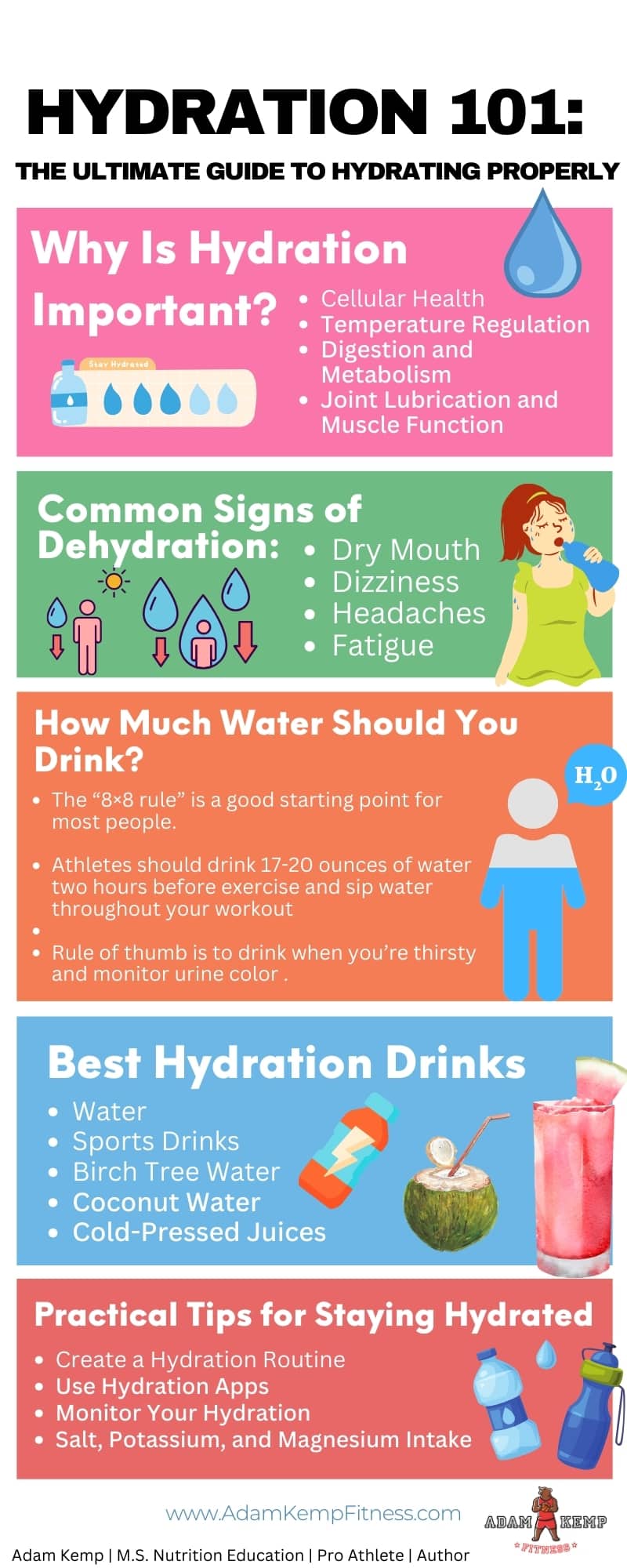
What is Hydration in the Body?
Hydration is the process of maintaining fluid balance so your body can function efficiently.
Maintaining fluid balance is essential for overall health, as water is vital for various physiological processes, including digestion, absorption, circulation, and temperature regulation (Popkin et al., 2010).
It supports cellular energy, nutrient delivery, waste removal, temperature control, and muscle and nerve activity.
Hydration vs. Fluid Balance: What’s the Difference?
Although often used interchangeably, hydration and fluid balance are not the same thing.
- Hydration refers to the presence of adequate water in the body to support basic functions like temperature regulation, digestion, and nutrient transport. It’s a snapshot of your current water status and how much fluid is available in your body right now.
- Fluid balance, on the other hand, is about regulation. It’s the body’s ability to maintain the right amount of water across different compartments, inside cells, in the bloodstream, and in tissues, while carefully controlling electrolytes like sodium, potassium, and magnesium.
You can technically be hydrated but still have poor fluid balance if electrolytes are off.
That’s why performance hydration involves more than just water—it’s about restoring both fluids and minerals to keep every system in sync.
Benefits of Proper Hydration: Why Is Hydration Important?
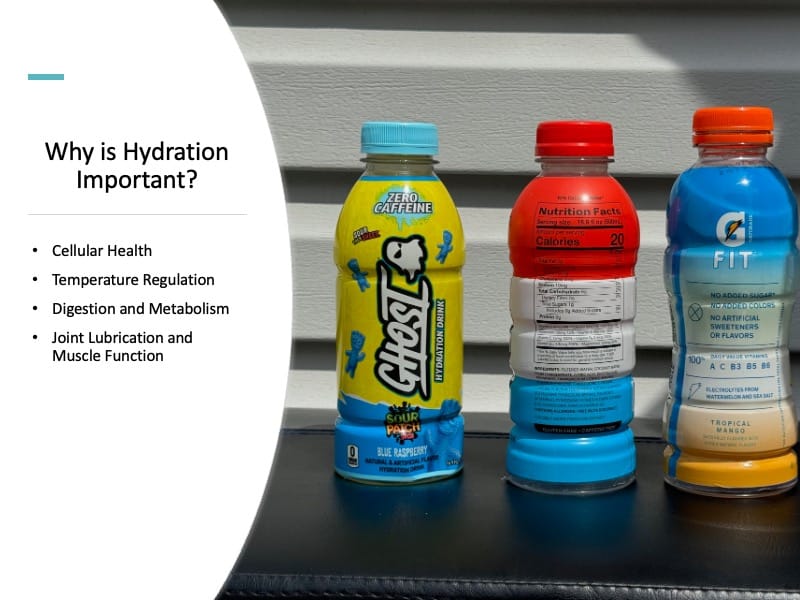
Hydration is essential for supporting nearly every biological process in the body.
From maintaining cellular health to optimizing physical performance, proper hydration is a cornerstone of good health and well-being (Liska et al., 2019)
Cellular Health
Water is crucial for delivering essential nutrients to your cells and removing waste products.
This balance enables your cells to produce energy and function efficiently, impacting everything from your immune system to muscle repair.
Temperature Regulation
Adequate hydration helps regulate your body temperature, especially during exercise or in hot environments.
Sweating is your body’s natural cooling mechanism, and without sufficient water intake, this system becomes less efficient, increasing the risk of heat-related conditions like heat exhaustion or heat stroke.
Digestion and Metabolism
Water plays a key role in breaking down food, aiding in digestion, and allowing for better nutrient absorption.
Proper hydration also supports metabolic processes, enhancing fat oxidation and overall energy expenditure, making it essential for those aiming to maintain or lose weight.
Joint Lubrication and Muscle Function
Water acts as a natural lubricant for your joints, reducing friction and supporting smooth movement.
This is particularly important for athletes and individuals with active lifestyles. Proper hydration also keeps muscles functioning at their best, reducing the likelihood of cramps, strains, or injury during physical activity.
Electrolytes and Hydration
Water alone isn’t always enough, especially for athletes and those engaging in prolonged physical activity.
Electrolytes like sodium, potassium, and magnesium are key to maintaining fluid balance.
What Are Electrolytes?
Electrolytes are minerals that help regulate fluid balance, muscle function, and nerve signaling.
When you sweat, you lose electrolytes, making it essential to replenish them, particularly during and after exercise.
When to Drink Electrolyte Drinks
If you’re engaging in prolonged exercise or in a hot environment, electrolyte drinks can help maintain your hydration levels. However, for short-duration activities, water may be sufficient.
Dehydration 101
Dehydration is more than just feeling thirsty—it’s a physiological state where your body doesn’t have enough fluid to function efficiently.
Even mild dehydration can compromise mental sharpness, physical performance, and long-term health.
For athletes, it can be the hidden factor behind a sluggish game, slow recovery, or unexplained fatigue.
For everyone else, it can quietly drain energy and affect focus, mood, and well-being.
Common Signs of Dehydration
The first signs of dehydration often go unnoticed or are mistaken for something else—like hunger or stress. These early indicators include:
- Dry mouth or lips
- Headaches
- Dizziness or lightheadedness
- Fatigue or low energy
- Dark-colored urine or infrequent urination
As dehydration worsens, symptoms can become more serious:
- Rapid heartbeat
- Muscle cramps
- Irritability or confusion
- Fainting or low blood pressure upon standing
Cognitive Consequences: Your Brain on Low Water
Your brain is roughly 75% water, and even slight dehydration can disrupt how it functions.
Losing just 1–2% of body weight in fluid can impair memory, reaction time, focus, and mood.
Studies consistently show that dehydration reduces alertness and increases the perception of effort during tasks—making everything feel harder, both physically and mentally (Popkin et al., 2010).
Dehydration & Athletic Performance
For athletes, even minor fluid loss can derail performance.
Dehydration reduces blood volume, making it harder for the heart to pump oxygen to working muscles.
It also impairs thermoregulation—your body’s ability to stay cool—which can lead to overheating, fatigue, and slower recovery.
Key performance issues caused by dehydration include:
- Early muscle fatigue and cramps
- Decreased strength and power output
- Slower reaction time
- Reduced mental focus and decision-making
Additional Risks of Chronic Dehydration
Chronic, low-grade dehydration is especially dangerous because it’s easy to ignore. Over time, it increases the risk of several health problems:
- Kidney stones: Concentrated urine from low fluid intake promotes stone formation.
- Urinary tract infections: Less fluid flow allows bacteria to multiply.
- Impaired kidney function: Persistent dehydration can slowly reduce the kidneys’ ability to filter blood and remove waste.
- Digestive issues: Insufficient water can lead to constipation and sluggish digestion.
Chronic dehydration may also contribute to joint pain, fatigue, and poor skin health—symptoms often misattributed to aging or stress.
Guidelines for Special Populations With Unique Hydration Needs
Hydration isn’t one-size-fits-all.
Age, life stage, environment, and activity level all influence how much fluid your body needs and how efficiently it holds onto it.
Certain populations are more vulnerable to dehydration and benefit from tailored strategies to stay safely and effectively hydrated.
Hydration for Children and Elderly
Maintaining adequate hydration is one of the most important health and fitness tips for children.
Children are less likely to recognize thirst, especially when engaged in play or sports.
Their smaller bodies also lose water faster through sweat, increasing the risk of dehydration.
Encourage regular water breaks—even when they say they’re not thirsty—and offer hydrating snacks like fruit to help meet their fluid needs.
For added electrolytes after high-energy activity, low-sugar options like Prime Hydration can support recovery without overloading them with sugar.
Coconut water is another gentle, natural alternative.
Older adults face a different challenge: as we age, the body’s thirst signals become weaker, and kidney function can decline—making dehydration more likely even without physical exertion.
To combat this, hydration must be intentional. Sipping water throughout the day, even without thirst, is key.
Herbal teas, water-rich fruits, and electrolyte-enhanced drinks like Prime Hydration can help maintain fluid and electrolyte balance safely and effectively.
Pregnancy and Breastfeeding
During pregnancy and breastfeeding, hydration becomes even more important.
Water supports the increase in blood volume, aids in nutrient delivery to the baby, and helps manage common symptoms like constipation or fatigue.
Pregnant women should aim for at least 10 cups (2.3 liters) of water per day, while breastfeeding women may need closer to 13 cups (3.1 liters) or more to support milk production.
Carrying a large water bottle and drinking with each meal and nursing session can help meet daily needs.
Hydration in Extreme Climates
Hot, humid environments increase sweat rates, accelerating fluid and electrolyte losses.
In these conditions, water alone might not be enough—adding sodium and potassium through food or electrolyte drinks becomes essential.
Cold climates present a different risk: thirst cues become blunted, and people tend to drink less without realizing they’re dehydrated.
In both cases, setting hydration reminders and drinking proactively is key.
Hydration Tips for Athletes
Proper hydration can improve athletic performance by maintaining energy levels and preventing injuries. Here are some of my best hydration tips for athletes to help optimize performance:
Pre-Workout Hydration
Hydration should begin long before your workout starts.
Drink water throughout the day and aim for at least 16 ounces 2-3 hours before exercise to ensure you’re well-hydrated going into your workout.
Intra-Workout Hydration
During exercise, aim to consume 7-10 ounces of water every 10-20 minutes, especially during intense or long workouts. This prevents dehydration, which can lead to muscle cramps and reduced endurance.
Post-Workout Rehydration
Replenishing lost fluids is one of the best things to do after a workout. Weighing yourself before and after exercise can help you estimate how much water you’ve lost.
For every pound lost, drink 16-24 ounces of water to fully rehydrate.
How to Stay Hydrated: Practical, Evidence-Based Tips
Staying hydrated is one of the simplest ways to support energy, cognition, and overall health, but it requires more than just remembering to drink water.
By building sustainable hydration habits, monitoring key markers, and supporting fluid intake with essential electrolytes, you can stay consistently well-hydrated throughout the day.
Create a Hydration Routine
There are many hydration routines which can have a positive impact on staying hydrated. Here is a simple option:
Starting your morning with 8–16 ounces of water helps rehydrate your body after overnight fluid loss and sets a positive tone for the day.
Continue sipping fluids regularly throughout the day rather than waiting until thirst kicks in.
- Carry a reusable water bottle to stay mindful of your intake and reduce reliance on bottled drinks.
- Set hydration benchmarks (e.g., finishing half your daily goal by midday) to spread intake evenly.
This strategy supports sustained energy and prevents the late-day fatigue often linked to mild dehydration.
Using implementation intentions, such as saying, “If I finish breakfast, then I’ll drink a full glass of water,” can automate hydration habits by linking them to daily cues, making consistent intake more likely.
This simple “if-then” planning strategy helps translate good intentions into reliable action.
Use Hydration Tracking Apps
Hydration tracking apps like MyFitnessPal, WaterMinder, or Hydro Coach can help you:
- Set personalized hydration goals based on weight, activity, and climate.
- Receive reminders to drink water regularly.
- Log fluid intake and view trends over time.
Digital tracking is especially helpful for busy professionals, athletes, and older adults who may struggle with thirst recognition.
Monitor Hydration Status with Simple Biomarkers
The easiest way to check your hydration is to observe the color of your urine:
- Clear to pale yellow: Indicates good hydration.
- Dark yellow or amber: Suggests you may need more fluids.
- Very clear urine consistently: Could mean overhydration and electrolyte dilution.
Additionally, symptoms like dry mouth, fatigue, irritability, or headaches can be subtle signs of dehydration.
Prioritize Electrolyte Balance
Proper hydration depends on the balance between water and electrolytes, especially sodium, potassium, and magnesium.
These minerals support nerve signaling, muscle contraction, and fluid distribution across cells.
- Sodium (Salt): Sodium helps retain water in your body and supports nerve and muscle function. However, excessive sodium can lead to fluid retention, while too little can cause imbalances in hydration. Aim for 2,300 mg per day, adjusting based on your activity level and sweat loss.
- Potassium: Potassium works with sodium to maintain fluid balance and helps muscles contract properly. It’s particularly important for regulating blood pressure and reducing the risk of cramping. A daily intake of around 3,400 mg (for men) or 2,600 mg (for women) is recommended.
- Magnesium: Magnesium supports muscle relaxation and helps maintain electrolyte balance, contributing to overall hydration. It also plays a role in preventing cramps and muscle fatigue. The recommended daily intake of magnesium is around 400-420 mg for men and 310-320 mg for women.
Best Hydration Drinks
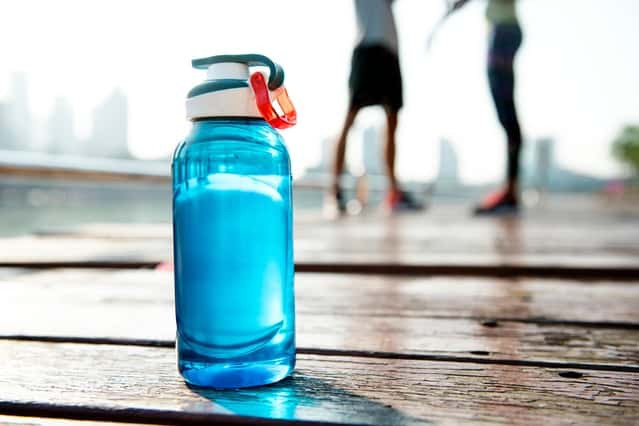
Choosing the best hydration drinks can significantly affect how your body absorbs and utilizes fluids.
While plain water is essential, the best hydration drinks also include other drinks that contain additional electrolytes, minerals, or natural compounds that support energy, recovery, and optimal fluid balance, especially during exercise, heat, or illness.
Water
Water is the best and most essential hydration drink. It keeps your body functioning optimally by regulating temperature, supporting digestion, and maintaining joint lubrication (Popkin et al., 2010).
Water is the best bet for most daily hydration needs due to its simplicity and availability.
If you’re engaging in light physical activity or working indoors, plain water is often sufficient to stay hydrated.
While the common recommendation is to drink eight 8-ounce glasses of water daily, hydration needs vary based on several factors.
The “8×8 rule” is a good starting point for most people, but hydration needs differ by age, weight, activity level, and climate.
A better rule of thumb is to drink when you’re thirsty and monitor urine color — pale yellow indicates proper hydration.
Athletes often need more water due to increased sweat loss during training.
- A general guideline is to drink 17-20 ounces of water two hours before exercise and sip water throughout your workout.
- After intense activity, rehydrating is critical — aim to replace lost fluids by drinking 16-24 ounces of water for every pound of sweat lost.
Sports Drinks
Sports drinks are designed to replenish electrolytes, carbohydrates, and fluids lost during prolonged or intense physical activity. However, not all sports drinks are created equal.
Prime Hydration and Gatorade Fit are two of the best sports drinks and examples of more natural hydration options that contain fewer artificial additives and less sugar compared to traditional sports drinks like traditional Gatorade or Powerade.
They provide a healthier alternative without sacrificing performance, making them excellent choices for both casual gym-goers and athletes.
Prime Hydration is marketed as a healthier alternative, using coconut water as a base and offering additional electrolytes without the high sugar content.
Gatorade Fit, on the other hand, is a low-sugar version of Gatorade that still provides the essential electrolytes like sodium and potassium that athletes need.
These drinks are beneficial for replenishing fluids after high-intensity workouts or long-duration exercises.
Birch Tree Water
Birch water, sourced from birch trees, is a popular hydration choice in some parts of the world due to its high magnesium content.
Magnesium is essential for muscle function, nerve signaling, and energy production, making it a key electrolyte for hydration.
- Magnesium Benefits in Hydration: Magnesium plays a significant role in maintaining electrolyte balance and preventing muscle cramps, especially during exercise. Birch water is naturally low in calories and sugar, making it a great option for those looking to hydrate while also getting a magnesium boost.
- Other Benefits of Birch Water: In addition to magnesium, birch water contains antioxidants and small amounts of potassium and calcium, further supporting hydration and recovery after physical exertion. It’s an excellent choice for people looking for a natural, low-calorie hydration drink with added health benefits.
Coconut Water
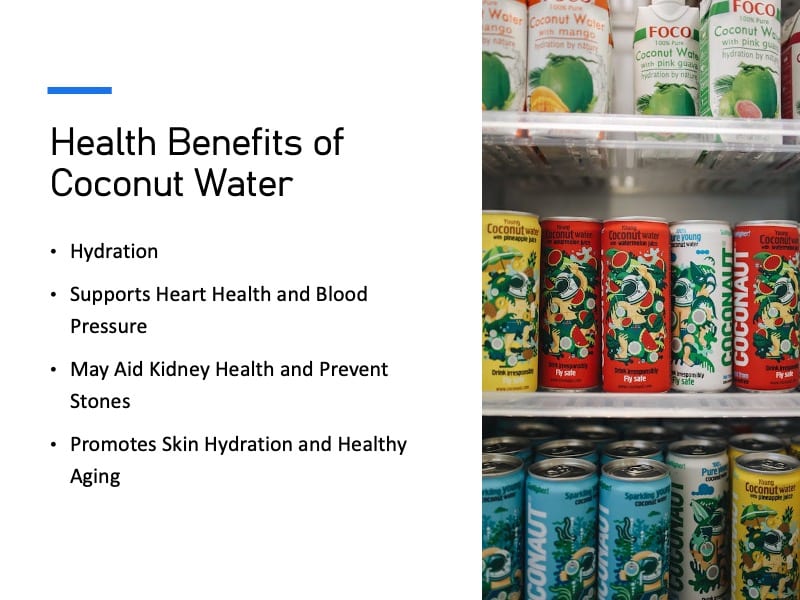
Coconut water is often referred to as “nature’s sports drink” due to its high potassium content and naturally occurring electrolytes.
It is an excellent choice for hydration, particularly after a workout, because it can quickly replenish lost electrolytes without added sugars.
However, although many companies market coconut water for athletes as a superior hydration option, it lacks the sodium content necessary for optimal recovery after heavy sweat loss.
- Potassium and Hyperkalemia: Coconut water contains a high amount of potassium, which is essential for maintaining proper muscle and heart function. However, drinking excessive amounts of coconut water can lead to a condition called hyperkalemia, where potassium levels become too high. While this is rare, it’s important to consume coconut water in moderation, especially for people with kidney problems or those at risk for electrolyte imbalances.
- When to Choose Coconut Water: Coconut water is perfect for those seeking a natural hydration source with electrolytes, particularly for activities that result in heavy sweating. Its low sugar content and natural minerals make it a better option than many commercial sports drinks, provided it’s consumed in reasonable amounts.
Cold-Pressed Juice
Cold-pressed juices made from fruits and vegetables are another excellent source of hydration, packed with vitamins and minerals.
Cold-pressed juices retain more nutrients than traditional juicing methods since they use hydraulic pressure instead of heat, preserving the natural vitamins and minerals.
Juicing once a day with water-rich fruits and vegetables is an excellent way to hydrate while also providing your body with antioxidants and nutrients that support overall health.
The key to making the most of cold-pressed juice for hydration is selecting the right ingredients.
Best Fruits and Vegetables to Juice for Hydration:
- Cucumbers: Extremely high in water content (over 96%) and great for juicing to boost hydration.
- Watermelon: Contains over 90% water and is packed with antioxidants, making it a great base for hydration juices.
- Citrus Fruits (oranges, lemons, grapefruit): Rich in water, vitamin C, and potassium, these fruits support both hydration and immune function.
- Celery: Another water-rich vegetable with a mild flavor that blends well with other fruits and vegetables.
- Spinach and Kale: These leafy greens are also water-dense and provide essential minerals like magnesium and potassium, crucial for hydration.
Best Hydrating Foods & Foods That Help with Hydration
Hydration isn’t just about drinking water. Certain foods have high water content and can contribute to your daily fluid intake.
High-Water-Content Fruits
These fruits are over 85–90% water and can significantly contribute to your daily hydration:
- Grapefruit (88% water): Contains electrolytes and antioxidants that aid both hydration and metabolic health.
- Watermelon (92% water): Rich in lycopene and potassium, ideal for rehydration and post-exercise recovery.
- Strawberries (91% water): High in antioxidants and vitamin C, making them a hydrating and immune-supportive snack.
- Oranges (86% water): Provide hydration along with potassium, vitamin C, and simple carbohydrates for energy.
- Pineapple (86% water): Offers bromelain (a digestive enzyme), hydration, and natural sugars for energy replenishment.
- Cantaloupe (89% water): A great source of beta-carotene and vitamin A while supporting fluid intake.
Water-Rich Vegetables
These vegetables are ideal for hydrating meals or snacks, particularly during warmer months:
- Cucumbers (96% water): One of the most hydrating vegetables, excellent in salads or infused in water.
- Celery (95% water): Contains natural sodium, potassium, and magnesium to help maintain fluid balance.
- Lettuce (95% water): Especially iceberg and romaine; great for adding hydration to wraps and salads.
- Zucchini (94% water): Can be spiralized or grilled, offering hydration with fiber and antioxidants.
- Tomatoes (94% water): High in water, lycopene, and potassium—perfect in fresh salsas or salads.
- Bell Peppers (92% water): Particularly red and yellow varieties, which also provide vitamin C and beta-carotene.
Broths and Soups
In cooler months, warm broths and soups are great ways to stay hydrated and consume essential electrolytes.
Drinking bone broth in the morning is especially effective because it supports hydration and can help improve your gut health.
Hydration Myths and Misconceptions
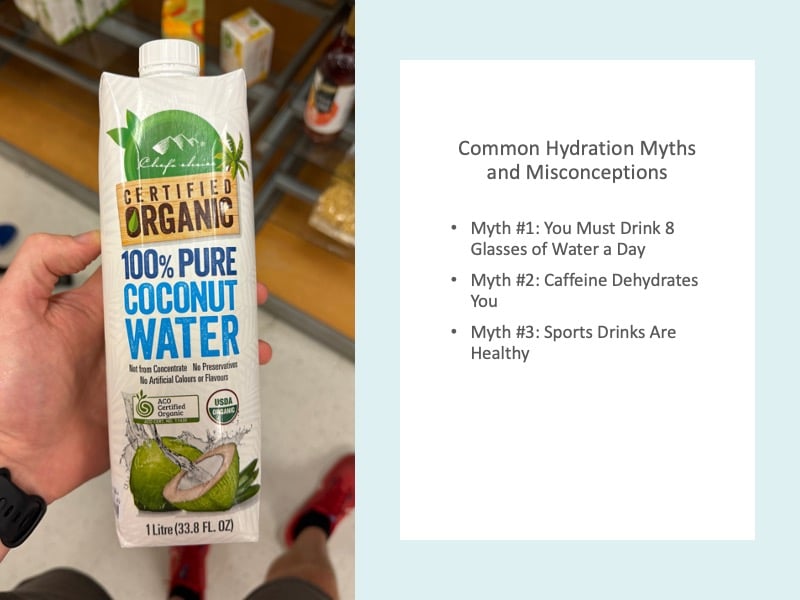
There are several common myths about hydration that can lead to confusion.
Myth #1: You Must Drink 8 Glasses of Water a Day
While this is a helpful guideline, your actual needs depend on factors like your activity level, body size, and climate. Some people may need more or less than 8 glasses of water per day.
Myth #2: Caffeine Dehydrates You
Moderate caffeine consumption does not significantly dehydrate you. In fact, beverages like coffee and tea can count toward your daily fluid intake.
Myth #3: Sports Drinks Are Healthy
Not all hydration drinks are created equal. Many are high in sugar and artificial additives.
When possible, opt for natural electrolyte options like Gatorade Fit or Prime Hydration, or make your own with a pinch of salt and a squeeze of lemon.
Final Thoughts: How Can I Improve Hydration?
Hydration isn’t a wellness trend; it’s a foundational healthy habit that supports every system in your body.
From nutrient transport and temperature regulation to muscle contraction and brain function, staying hydrated ensures your body runs efficiently and feels its best.
Improving hydration doesn’t necessarily mean drinking more water—it means drinking more intentionally.
Here’s how to hydrate smarter:
- Start your day hydrated: Drink a glass of water first thing in the morning to replenish overnight losses and jumpstart digestion and metabolism.
- Use consistent intake over large volumes: Sip fluids regularly throughout the day instead of chugging large amounts all at once, which your body may not absorb efficiently.
- Pair hydration with electrolytes: When sweating or exerting yourself physically, incorporate natural electrolyte sources like sea salt, coconut water, or low-sugar sports drinks to maintain fluid balance and prevent muscle cramps or fatigue.
- Eat hydrating foods: Add water-rich fruits and vegetables—like cucumbers, watermelon, and oranges—to boost hydration through your meals.
- Track and adapt: Use hydration tracking apps or simply observe urine color as a quick feedback loop. Clear or light yellow urine usually indicates good hydration status.
- Stay ahead of thirst: Don’t wait until you feel thirsty—by that point, your body is already experiencing mild dehydration.
By making hydration a daily priority—not a reactive measure—you’ll improve energy, mental clarity, workout recovery, and long-term health outcomes. Whether you’re managing a demanding training schedule, working long hours, or simply aging well, hydration is one of the most accessible and impactful health strategies available.
FAQs
Hydration is foundational to maintaining optimal health and peak performance. Whether you’re an athlete or simply trying to improve your well-being, making hydration a priority will help you feel and perform at your best.
Drink regularly, monitor your body’s signals, and incorporate hydration into your daily routine.
Here are some commonly asked questions about hydration:
This website does not provide medical advice. This website site does contain affiliate links, and purchases may earn a commission.
Read my Medical Disclaimer, Review Disclaimer, and Publishing Policies for more details. Use of this site indicates acceptance of these terms.



